by Jay S. Jacobs
Copyright ©2006 PopEntertainment.com. All rights reserved.
Posted:
May 27, 2006.
Is it possible that the next
big thing in music is a thirtyish woman from Scotland?
An adopted daughter of a scientist who had no real interest to speak of in
music? An iconoclast who became a figurehead of a local music scene
where lack of commercial success was considered a badge of honor? A busking guitarist who played guitar on streets all over Europe and once
got a quid from a member of then British supergroup Take That?
Welcome to the fascinating life of KT Tunstall.
The initials don't mean anything, by the way. She just thought it
looked better than her given name Kate, which Tunstall felt was too
reminiscent of English roses and Dickens novels. Tunstall never
imagined music as a vocation until her mid-teens when she went to boarding
school in the US, but she has been making up for lost time ever since.
Tunstall started her first band when a student in
Connecticut. Then at sixteen, she got a railpass and decided to
travel around Europe to see the sights and play her guitar. She
first really popped out on the music scene back in her homeland. Tunstall
became a respected indie artist and lived with then-boyfriend Pip Dylan
while they tried to release artistically relevant music that the world
probably would never get. There was an unofficial competition in the
scene to get the lowest sales
Ė it proved that you were willing to suffer
for your art. However, Tunstall finally realized that while it was
romantic to be a starving artist she really wanted to be able to eat and
pay rent, so maybe she should take the idea of getting her music heard
more seriously.
She has had several near misses as far as label
signings before
Ė in fact Sony honcho Tommy Mottola was on the verge of
signing her when he ended up leaving the label in the dispute.
However what doesn't kill you makes you stronger and Tunstall kept on
keeping on, not listening to the people telling her that younger girls are
the ones that get signed. Good thing she didn't pay attention, because she
finally connected with a label and had her opportunity.
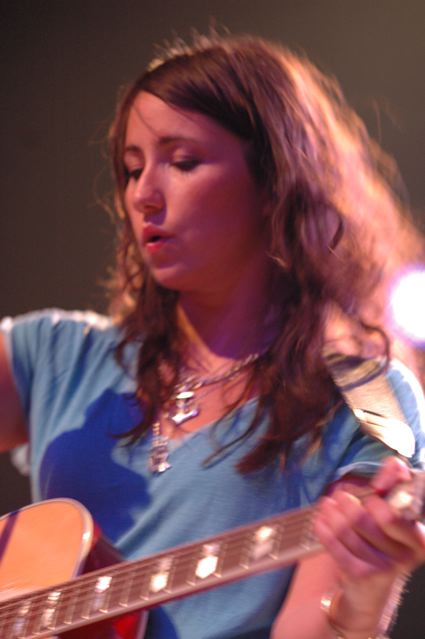 Her
major-label debut album, Eye to the Telescope, was originally
released in late 2004 in Europe. It had a slow burn, quietly working
its way up the charts. Suddenly Tunstall was everywhere
Ė she had
hit singles with the amazingly hooky and unique songs "Black Horse and the
Cherry Tree," "Suddenly I See," "The Other Side of the
World" and "Under the Weather." Then Tunstall won the Brit Award (the UK equivalent of the Grammys) as Best
British Female Solo Artist. (Tunstall insisted on stage that is should be
shared with fellow nominee Kate Bush.) Ironically, at the Awards she
ran into former Take That member Mark Owen and reminded him that he had
given her the pound when she was out there busking. He laughed and
said that if his comeback doesn't work out he may have to get it back.
Her
major-label debut album, Eye to the Telescope, was originally
released in late 2004 in Europe. It had a slow burn, quietly working
its way up the charts. Suddenly Tunstall was everywhere
Ė she had
hit singles with the amazingly hooky and unique songs "Black Horse and the
Cherry Tree," "Suddenly I See," "The Other Side of the
World" and "Under the Weather." Then Tunstall won the Brit Award (the UK equivalent of the Grammys) as Best
British Female Solo Artist. (Tunstall insisted on stage that is should be
shared with fellow nominee Kate Bush.) Ironically, at the Awards she
ran into former Take That member Mark Owen and reminded him that he had
given her the pound when she was out there busking. He laughed and
said that if his comeback doesn't work out he may have to get it back.
Eye to the Telescope
finally made it to the US in late 2005
Ė with a new cover because the
European cover had Tunstall wearing some quirky rainbow suspenders that
she found and liked, only later to be told that they were a
signal of lesbianism. Tunstall respects and loves her lesbian
following, but she is in a longterm relationship with her drummer
boyfriend Luke Bullen.
Like in Europe, the album has had a slow burn but is
gradually ingratiating itself into the American conscious. The first
single, "Black Horse and the Cherry Tree" is currently firmly entrenched
in the US Top 40 and there are a few potential follow-ups just waiting,
particularly the nearly perfect folk pop ditty "Suddenly I See."
Her music is making inroads on other levels than the
record stores and radio, too. Television has embraced her music.
American Idol finalist Katharine McPhee performed "Black Horse and
the Cherry Tree" twice on the impossibly popular talent contest.
This exposure certainly helped, "Black Horse" was already on the way up
the charts but it exploded into the top 30 when it was on the show.
The producers of the smash doctors melodrama Grey's Anatomy picked
up on "The Other Side of the World," using it conspicuously in a recent episode of the
series.
As Tunstall's album and single rocket up the charts,
she took the time to talk to us about her life as a breaking star.
How did you
originally get into music?
Well, it didnít
take much effort. (laughs)
I was purportedly just addicted to anything that was playable at a very,
very early age. Then eventually I persuaded my parents to get me a piano
when I was around six or seven. They bought me a second-hand piano and it
got put in my room and I started lessons. The proper
start of getting into music was classical training, really.
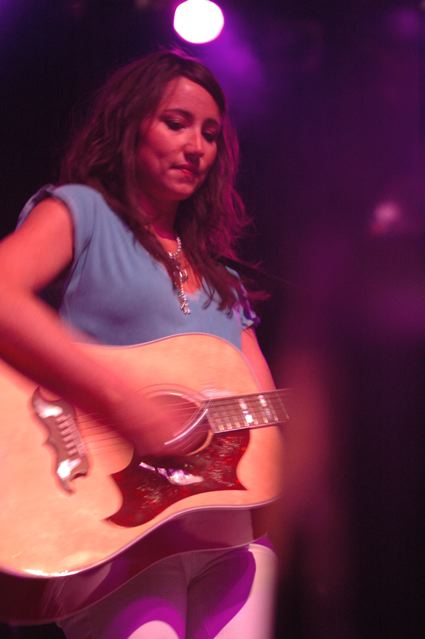 Iíve read your parents were not
particularly musical Ė at least as far as in their
professions. Was it a musical household?
Iíve read your parents were not
particularly musical Ė at least as far as in their
professions. Was it a musical household?
No. We didnít
listen to music. They still donít have a stereo system.
Theyíve got a tape player and a CD player for playing my album, but they
donít have a record collection. Listening to music wasnít a big part of
growing up for me at all.
Could you ever imagine when you were
growing up in St. Andrews your life going like it has?
Well, the thing was
I was really into theater. There was a little grass roots theater group
run by a local couple. A local composer would write musicals for us.
There was like twenty kids in it. I could hold a tune, but I wasnít a
little singing prodigy or anything like that. I loved to perform. I
loved acting. I was doing well, you know, I think, as far as the acting
side went. I was sticking out a bit and getting some main parts. I
started that when I was eight. So performance was immediately a very
addictive thing to me.
For many years you were out busking and
having near misses as far as signing a recording contract. In the past
slightly over a year year, youíve had several hits in Europe. You won
Best Female Artist at the Brits. Now over a year on from the original
release of
Eye to the Telescope you are
breaking out in the US as well. How surreal has your year been?
Itís been magical.
Itís just been the most incredible year of my life. But then, in the same
breath, itís taken me the best part of ten years to try and get somewhere
with it. So much of the feeling is one of vindication and just feeling
like all that time spent trying was worth it.
Do you feel more ready to deal with the
whole stardom thing now than you would have when you almost signed with
Columbia years ago?
Oh, yeah. If this
had happened to me when I was young; A) I donít
think I would have made as good a record and B)
Iíd just be a mess. I think it would just be too much. You get to thirty
and you have a much better idea of what you want Ė and just as
importantly, what you donít want. Itís a real relief to me that itís
taken so long. (laughs)
Is the title of the album a tribute to
your childhood and your father?
It is, yeah. My
dad was a physicist. He used to take us to the local observatory when we
were kids and show off astronomical wonders through the telescope.
(laughs)
It was just an analogy, really for what the album is about. Just focusing
in on these small things and revealing how big they actually are.
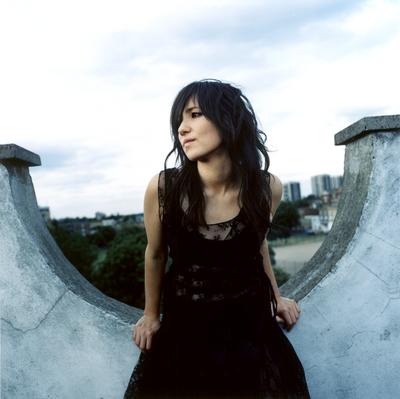 In ďUnder the Weather,Ē you sing in the
chorus, ďfeels like homeÖĒ to show comfort and satisfaction. What feels
like home to you?
In ďUnder the Weather,Ē you sing in the
chorus, ďfeels like homeÖĒ to show comfort and satisfaction. What feels
like home to you?
Just friends,
basically. Wherever friends and family are. Iím not really
that into astrology, but my star sign is remarkably apt, actually. Iím a
Cancer, but Iím right at the beginning of the sign. So Iím part Gemini.
Someone was explaining this to me. Basically, Cancerians love nesting.
They have to have home. I very much relate to that. I feel if I didnít
know I had my little flat back in London, I would be very unhappy. Itís
really important to me that when I go home, I walk in the door and thatís
where I belong. Itís familiar. Itís grounding. At the same time, I have
this Gemini thing, where one minute Iíll be wanting to stay in with my
pajamas on and the next minute Iíll want to be out clubbing until five in
the morning and drinking whiskey backstage with boys. I have this
definite duplicity to my personality.
In your music in general when the songs turn to love, I
noticed a lot of the time the relationships are positive, like ďUnder the
Weather,Ē ďThrough the Dark,Ē ďHeal OverĒ and ďBlack Horse.Ē Itís funny,
but in general it seems writers tend to spend more time on relationships
that are in trouble or dyingÖ
Well, part of that is it doesnít excite me to write morose,
shoegazing songs, in general. If Iím going to write a song like that,
then itís got to be really, really special. Itís much easier to write a
sad song. I donít know, itís just Iím allergic to clichťs. I think that
in itself can be a clichť, just writing a depressing love song. I donít
enjoy playing them. Iím not interested in airing dirty laundry for the
sake of it. For me itís got to have a window and itís got to have a light
at the end.
I read in an interview that you said the production of the
album was far from your more traditional early sound. Why did you decide
to make that leap in your sound?
Well, I think what Iíve ended up sounding like; I wouldnít describe it as
more slick and more commercial. I would say that it grew up, because
basically I was playing picking folk stuff when I was younger. I was
hanging out with some quite eccentric folk musicians in Fife, where Iím
from, and in St. Andrews. I kind of realized I wasnít writing weird folk
music. What I was writing was more accessible and more upbeat. So I
moved to Edinburgh and I set up a music night and I got a band together Ė
a three-piece rock band. That wasnít really reaching its potential
either. I was feeling stuck, so I packed that in and finally went to
London. Meeting Steve (U2 and New Order producer Steve Osborne) and
working with Steve is a huge part of it, because we listened to a lot of
old blues when we were working on the record. It was an incredibly frugal
setup. We recorded the album very, very cheaply. It was made for a
fraction of the cost of your usual big deal album. We took a lot of
inspiration from these old blues guys Ė Bo Diddley and that kind of
thing. Listening to it just being stripped back and simple and not just
throwing in pads of sound. You know, I think thereís strings on one
tune. Itís on ďThe Other Side of the World.Ē Steve basically injected
thisÖ he was the first person I worked with that allowed me to be
aggressive on the guitar. Before, people, when I did demos they said ďyou
have to carom down on your guitar to let the other instruments out.Ē
Steveís like, ďno, no, no. You carry on doing what youíre doing. Make it
play for you, you know?Ē Really it was in the post-production of the album
that it got mixed so that it sounded much more expensive than it actually
was. (laughs)
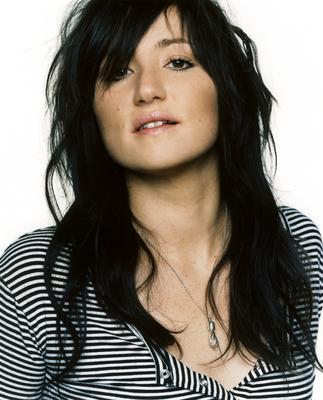 As
far as airplay, youíre sort of lucky that you live in Europe. In the US,
radio playlists are so regimented these days. Itís surprising nowadays
when a song like ďBlack Horse and the Cherry TreeĒ breaks through, but you
used to be able to hear rock, pop, country and soul on the same station
and that just doesn't happen anymore. Do you think that can make it
tougher for a band to find an audience?
As
far as airplay, youíre sort of lucky that you live in Europe. In the US,
radio playlists are so regimented these days. Itís surprising nowadays
when a song like ďBlack Horse and the Cherry TreeĒ breaks through, but you
used to be able to hear rock, pop, country and soul on the same station
and that just doesn't happen anymore. Do you think that can make it
tougher for a band to find an audience?
Yeah. I think that the competition is incredibly fierce
today. So I imagine that the amount of effort that has to be put in
trying to break through is much greater than perhaps you had ten years
ago. Because the market is absolutely saturated with people desperate to
try and get through. Now youíve got these TV reality shows that are
taking up a large percentage of the space that used to be taken up by
people that write their own stuff. And, like me, spent a long time trying
to get there. So itís becoming even more difficult now to get through,
because you have so much money marketing and promoting these TV acts and
taking up a lot of the space. Really, I think the most important thing is
being sure itís about being a vocational musician. Itís not about being
famous and itís not about being loaded. Itís about getting yourself into
a position where you can play gigs and people will come. Thatís all I
wanted, so the actual level of the success the album has enjoyed is quite
surprising. It wasnít necessarily intended. (laughs)
On the other hand, there are a lot of new ways for music to
get out there Ė the internetÖ
Yes, the internet is amazingÖ
Also Iíve heard ďBlack HorseĒ on commercials for that show
Pepper Dennis, and I noticed a bump up of airplay for
the song when Katharine McPhee performed it on American Idol.
Yes, thatís right.
They also used ďSuddenly I SeeĒ on
Windfall
and "The Other Side of the World" on
Greyís Anatomy. Do you think
these alternative avenues can help open up the audience?
Yeah. Yeah. Oh God, yeah. Obviously. Television is the
messenger these days. I mean, I donít have a television anymore; I
havenít had one for about three years. I forgot how incredibly
far-reaching television really is. As a new artist, itís amazing Ė to be
able to play to 200 people in February and then to be able to play to
2,000 people in April. All these people. Iíll do these album signings
and meet and greet things and theyíre like, ďOh I heard your song on this
or I heard it on this, or I saw it on Desperate HousewivesÖ And I
bought the album and I love your albumÖĒ Itís become a really,
really good way for a new artist to be heard.
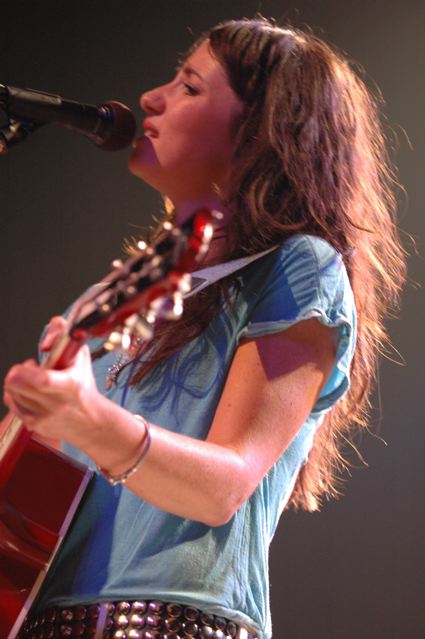 Iíve
seen your influences sited in different stories as such diverse artists as
Joni Mitchell, David Bowie, Ella Fitzgerald and the Beta Band. Do you
think this wide taste makes it easier or harder for you as an artist?
Iíve
seen your influences sited in different stories as such diverse artists as
Joni Mitchell, David Bowie, Ella Fitzgerald and the Beta Band. Do you
think this wide taste makes it easier or harder for you as an artist?
To what extent?
To give you more of a palette to work with as far as styles
and genres?
Yeah I think it probably [does]Ö The good thing is because
I didnít get into listening to music until I was quite a lot olderÖ I was
seventeen, sixteenÖ I mean I was obviously aware of music on the radio and
the television and stuff like that. But I wasnít a big fan of anything
until I was a bit older. I think thatís allowed me to explore and hasnít
hemmed me in. Itís not like Iíve grown up addicted to Northern Soul.
Thatís obviously going to effect what you create yourself. I started out
with a pretty blank page which is good. Thereís often something really
good, creatively, about being isolated from stuff.
Another influence I read for you is Tom Waits. I wrote a
book about himÖ
Oh, really...
So I always like to ask people I interview what they think
of his work. What do you think of him as a fellow songwriter and
performer?
I think Tom Waits is really great. Heís just the King of
independents. Heís just an absolute bastion of purist music. I have to
say Iím not as militant as Tom Waits. I also don't write stuff as
experimental as Tom Waits. But Iím just so delighted that we live in a
world where he is a widely, very celebrated man. In a world where this
industry is becoming more and more controlled and less and less creative,
it seems [nice] that heís still increasingly popular.
One of the
first records I bought for myself was Bone Machine. I bought
Bone Machine and I also bought Blue by Joni Mitchell at the
same time. Iím trying to create the bastard offspring of these two
albums. I always want to try to get this lo-fi masculinity to the music
if I can. Because I love that sound.
I saw on your website a tease that youíre releasing a
CD/DVD called
Acoustic Extravaganza. Whatís
that going to be?
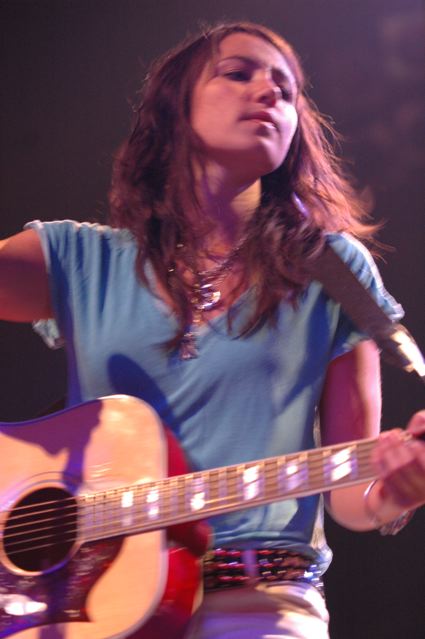 Yes. Well thatís out now, actually. It was just something I really
wanted to do. Weíd been playing the record for about a year in the UK and
still very much enjoying it. The band and I are very keen to allow the
material to mature. So itís not like weíre kind of desperately bored of
playing the same shit again and again. We do kind of progress with it.
But I just really wanted to do some recording live. Just get together, I
think probably just to ground myself just a little bit and really get back
to basics. Enjoy just playing together. Also, because we hadnít been a
unit as a band when we made the record. Weíve become something very solid
through gigging the record. I wanted to document that. So we went to the
Isle of Skye, which is just off the west coast of Scotland Ė one of my
favorite places in the world. A friend of ours has a studio in the
basement of his house. We set up in his living room and he drilled a hole
in the floor and we set the multi-core up through the floor. Then we all
just sat and played. We recorded it in a day. My good friend from
college whoís a filmmaker came up and made a little DVD. It was really a
brilliant experience. Iím very proud of what we did.
Yes. Well thatís out now, actually. It was just something I really
wanted to do. Weíd been playing the record for about a year in the UK and
still very much enjoying it. The band and I are very keen to allow the
material to mature. So itís not like weíre kind of desperately bored of
playing the same shit again and again. We do kind of progress with it.
But I just really wanted to do some recording live. Just get together, I
think probably just to ground myself just a little bit and really get back
to basics. Enjoy just playing together. Also, because we hadnít been a
unit as a band when we made the record. Weíve become something very solid
through gigging the record. I wanted to document that. So we went to the
Isle of Skye, which is just off the west coast of Scotland Ė one of my
favorite places in the world. A friend of ours has a studio in the
basement of his house. We set up in his living room and he drilled a hole
in the floor and we set the multi-core up through the floor. Then we all
just sat and played. We recorded it in a day. My good friend from
college whoís a filmmaker came up and made a little DVD. It was really a
brilliant experience. Iím very proud of what we did.
Well, you were saying earlier about how great the internet
is. I was reading your tour diary on your web site. Do you like the fact
that you can find out what your fans think through things like your site
or bulletin boards or MySpace or whatever?
Well thatís exactly it. Itís just knowing what your fans
think. I set up that website well before I had a record deal and itís
changed very little. Itís just got more traffic. I hate that word
traffic, when youíre talking about people visiting web sites. I mustnít
say that. Other people say that. People visiting web sites. (laughs)
No, but itís very important to me to keep a handle on what people are
making of what Iím doing. Not that it would necessarily change what I do,
but I think Ė you know, itís easy to just disappear up your arse. It also
just leaves a handle on how much it means to people. Thatís great. I
really get a lot from keeping in communication with people who are into
what Iím doing. Itís a great source of confidence, apart from anything
else.
In the end, in the big picture, how would you like people
to see your music?
Just honest. I just do what comes out and I donít fight it. I make sure
Iím just doing the best I can. Itís important to me that people see it as
sincere, I suppose.